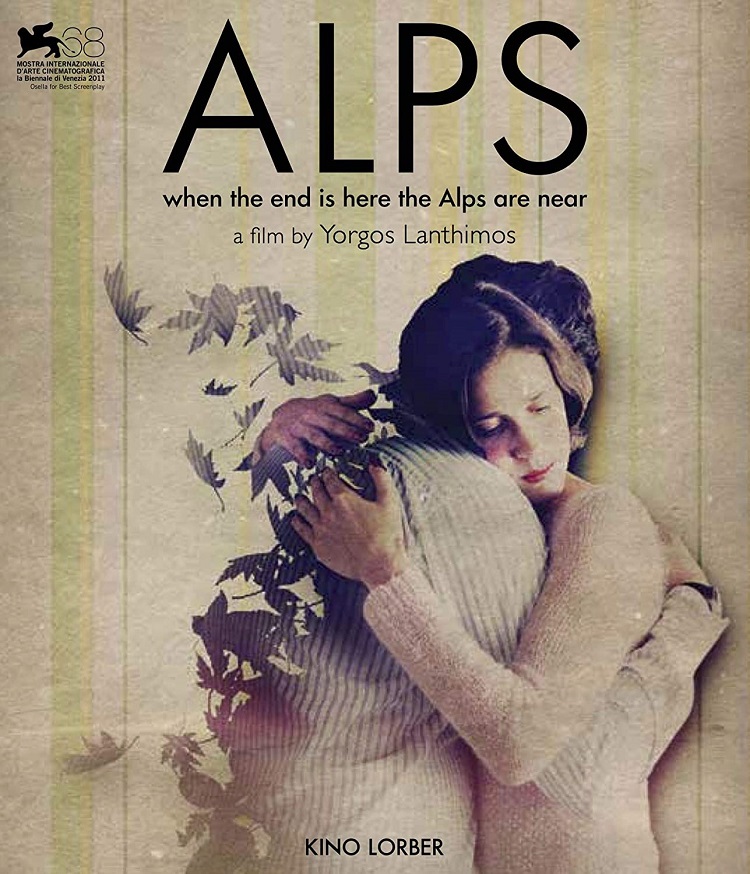
Greek director Yorgos Lanthimos often makes movies about insular groups of people who live in absurdist worlds that create and uphold outlandish rules. Yet he somehow makes them seem real and often surprisingly sympathetic. Coming off the festival circuit success of Dogtooth – in which two parents keep their three children locked inside a compound teaching them the outside world is full of violence and make up new definitions for common words – he wrote and directed Alps about a group of people who, for a fee, pretend to be the recently deceased for their grieving relatives. It is just as weird as one expects from Lanthimos, but not nearly as comprehensible as his other films and easily my least favorite of the ones I’ve seen.
This group calls itself “the Alps” and each of its four members has taken on the name of one of the mountains in that chain. The film centers on a night nurse called Monte Rosa (Aggelika Papoulia). At the beginning of the film, she chooses a young tennis player who was in a tragic car accident to be their next client (or at least the tennis player’s family to be their client as the girl isn’t expected to live). But then when the girl dies, Monte Rosa tells the group she made a miraculous recovery and offers their services to the family on her own. The reasons for her doing this are obscure.
The reasons for anybody doing anything in this movie are obscure. With films like The Lobster – where single people have 45 days to find a suitable partner or they will be turned into an animal – and The Killing of a Sacred Deer – in which a young man uses his psychic powers to make a surgeon’s family deathly ill in order to force him to kill either one of his children or his wife – Lanthimos created worlds with utterly bizarre rules and order but they at least had definable rules and the characters behaved in a manner that made sense within those rules. With Alps, the rules are poorly defined, making the character decisions obtuse and opaque.
It works like a parable, and clearly Lanthimos is saying something, it is just that whatever meaning there is has been completely lost on me. He films it with his usual certainty and solemness and the members of the Alps organization all behave in the same unattached manner (except for periodic bouts of intense violence). As such, it is difficult to tell when they are “in character” so to speak or living their normal lives. Is the old man whom Monte Rosa visits regularly her father or another client? Is the fact that she seems to be having sex with some of her male clients part of the act, or an indication that she’s beginning to lose it? It is impossible to know the answers.
Two of the members of Alps are a dancer and her coach. While the other two members (the nurse and the leader of the group) work in the healthcare industry these two seemingly have no connection to healthcare making it unclear how they joined or why. The coach is, in fact, quite cruel, threatening violence to his pupil when she questions his authority. Why then either wants to “help” these mourners is yet another question without an answer.
It isn’t that the answers need to be completely explained but when everything is so completely hidden, I find it hard to come away from the film with anything more than befuddlement.
The actors are all quite good, especially Papoulia, and Lanthimos’s direction is well handled. He’s clearly one of our very best filmmakers and his subsequent films, including the most recent The Favourite, prove he had much more to say after Alps. And this is well worth seeing. I just wish there had been one more scene or two that helped clear up just what he was going for.
Kino Lorber presents Alps in a 2.35:1 aspect ratio with a 1080p transfer. The only extra is an audio commentary from film historian Amy Simmons.
I’ve been watching Lanthimos’s films in reverse order which has been a fun way to see how he has grown as a director. This one feels like a misstep, but it is well worth watching.